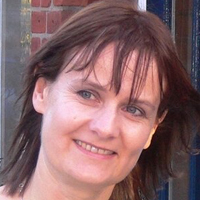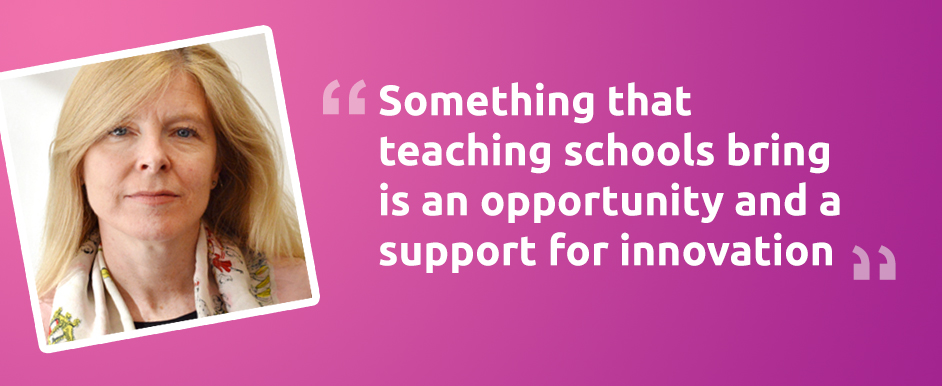In our latest guest blog, Annie Grant interviews Margaret Mulholland, Director of Development & Reseach at Swiss Cottage Development & Research Centre in Camden, North London. Swiss Cottage School is a National Teaching School that has been rated ‘outstanding’ by Oftsed five times in a row.
Tell me about Swiss Cottage School
Swiss Cottage is a large special school in Central London with a population of 230 children, with a range of complex and moderate learning difficulties. We’ve just had our 5th Ofsted inspection and, for the fifth time, have been judged to be ‘outstanding’, which is very exciting.
We’re a teaching school so we have a particular focus on training teachers and on developing school leaders. Teaching schools are built on a teaching hospital model, where you’re developing practitioners through the work that you do.
We’ve been a teaching school for two years now and that’s brought a completely different dimension to the culture of the school. As a school, we are keen to put research at the centre of our practice and it’s my job to spearhead that aspect of development. Research is key to developing more effective teaching and learning and, at Swiss Cottage, we’re looking to develop evidence-based practice, building on evidence of what works well to improve what we do.
We work across a group of schools – our partner schools. We’re all part of the Teaching School Alliance and we share best practice, learn together and collaborate in training support staff, young teachers and middle and senior leaders.
What does that look like practically, day-to-day?
At Swiss Cottage, the Development and Research Centre is on the 4th floor of the new school building and we have a training space where we host workshops.
We’re very much trying to bring theory and practice together. So it might be that if you come up to the Development and Research Centre on a Wednesday afternoon you’ll find, in one room, a group of trainee teachers learning about assessment for learning, involved in a workshop, having just been down into the classrooms to observe before coming up to reflect on what they have seen. In another room you might find a group of Swedish visitors who have come over to learn about what special needs provision looks like in London and how we support progress for our learners. We do a lot of international work. We also do regional work, so our staff work with mainstream schools to support them with their inclusive practice.
We also work with universities. We go in and do talks and workshops to train up the next generation of teachers and to identify practitioners who may want to work in special education.
One of our key messages is ‘What’s Special About Special?’ We want educational professionals to think about what special needs education can offer mainstream education and how we can share our expertise.
What impact does this work have on your own staff?
There is a confidence that comes from developing as practitioners and focusing on continuous learning. Staff have access to the latest research. If you are a teacher at Swiss Cottage, you would be able to engage in workshops run by, for example, the centre for Education in Neuroscience in London, and that would be happening right here in the Research and Development Centre.
You would know where you can identify support for your own action research. As part of the Teaching Schools Alliance, staff can visit our partner schools to learn about what works well in other settings. So there are broader opportunities for them.
Something that teaching schools bring is an opportunity and a support for innovation and, at Swiss Cottage, there’s an expectation that staff will innovate. So, for example, we’re trialling technology projects, working memory resources and activities, and we’re engaging with neuroscience projects. There are all sorts of innovations that we test out to identify their potential to make an impact on the learning of our young people.
Coaching and mentoring professionals from other schools has a positive impact on the professional development of those of our teachers involved in outreach. It embeds new practices and approaches and gives them new confidence about their own professional skills.
It also heightens the reflective practice in the school. We’re very focused on reflection in our day-to-day practice. At Swiss Cottage, teachers and teaching assistants have a planning meeting on a Monday morning, which allows them to discuss their expectations for the week. On a Friday we have a reflection meeting where 40 minutes is spent in looking at what went well during the week and how that will inform planning for the following week. And those principles, that cycle of professional learning, is applied in everything we do and being involved in outreach heightens and informs that reflection.
How does a training relationship with a special school benefit mainstream settings?
In Swiss Cottage we have the opportunity to engage professionals from mainstream schools in the dialogue about the skills they bring and how they might use these to enhance mainstream classrooms. When we work with them, say, on personalising learning, differentiation and thinking about pupil progress, we talk to them about what they can learn from a special setting and how they can use the special setting as a resource to inform their teaching. So we hope that as we springboard them back into their mainstream school, as an NQT, or in their first year as a middle leader, they’ll recognise that when they meet barriers in their teaching, that they can come back to the special setting and use us to support them to move forward and improve their practice.
And in the future?
Partnership is an important process but the goal is to promote an understanding of how special schools and special partnerships – special school alliances – can improve teaching and learning in mainstream and special schools throughout the country. I think we’ve got a big role and an exciting role to play and it is very important that we articulate it, clearly and loudly.
You can read more about ‘What’s Special about Special’ in a blog piece on the Swiss Cottage website.
About the interviewer
Annie Grant, Educational Consultant and Director at Atomic Productions, is a writer and film-maker specialising in special educational needs and disability. She writes regularly for ‘Special Children’ magazine and is currently filming a series of best practice case studies for the nasen online YouTube channel.
About the interviewee
Margaret Mulholland, Director of Development & Research at Swiss Cottage School, has over 20 years’ experience in delivering education, initial teacher education and professional development and is currently the Director of Development and Research at Swiss Cottage School Development & Research Centre.



